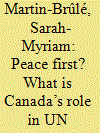| Srl | Item |
| 1 |
ID:
179155


|
|
|
|
|
| Summary/Abstract |
Intelligence is seen as an inherently sovereign matter. States are ready to share intelligence but on their own terms and only with friends or allies. This is the case for the North Atlantic Treaty Organization (NATO) and the European Union (EU). Intelligence at the United Nations (UN) poses a twofold problem, both from the states’ and the organization’s perspectives. The worldwide composition of states with different political natures and domestic interests has long been identified as the main reason why states would not want to implement an intelligence structure at the UN. States do not wish to share secrets with all the countries in the world and refuse to allow other states to send troops to spy on their own governance. Moreover, the UN has long been associated with the concepts of neutrality and impartiality, which are perceived as antithetical to the activities of an intelligence bureau within the organization.
|
|
|
|
|
|
|
|
|
|
|
|
|
|
|
|
| 2 |
ID:
160797


|
|
|
|
|
| Summary/Abstract |
In the wake of the Canadian government’s pledge for a renewed role at the United Nations (UN) notably by reengaging in peacekeeping activities, this special issue focuses on Canada’s added value to peace operations. Our aim is to identify the goals, challenges, and stakes for Canada’s reengagement in peace operations as a central component of foreign and defence policy. One of the first questions to ask is how can Canada contribute to peace operations which are now characterized by more complex security environments, in a way that is consistent with its interests, resources, and capacity? The second question relates to Canada’s engagement in peace missions in the context of a continuously evolving technological landscape. Finally, we address defence planning, equipping the Canadian Armed Forces, and managing personnel, as they relate to UN operations. The time is ripe to revitalize the debate on peace operations and analyze Canada’s capacity in this area.
|
|
|
|
|
|
|
|
|
|
|
|
|
|
|
|